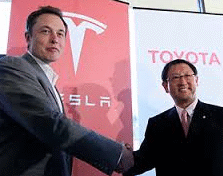 Toyota Motor Corp. has been carefully watched by advocates of clean vehicles – its Prius became the symbol of innovation in the hybrid space even though several other competitive hybrid models were launched around that time. When Toyota made an agreement in 2010 with Tesla Motors to integrate its electric motor and batteries into the Toyota RAV4 EV, along with Toyota’s $50 million investment in Tesla and Tesla’s takeover of the shuttered NUMMI factory in Fremont, Calif., the working relationship looked very promising. It also helped strengthen Tesla’s promise to become a thriving automaker (which was also supported around that time by Daimler’s investment). The Toyota and Tesla relationship seemed to sour this month when Toyota announced that it will phase out an agreement from 2012 for Tesla to deliver 2,600 battery packs for Toyota’s electric RAV4 over three years.
Toyota Motor Corp. has been carefully watched by advocates of clean vehicles – its Prius became the symbol of innovation in the hybrid space even though several other competitive hybrid models were launched around that time. When Toyota made an agreement in 2010 with Tesla Motors to integrate its electric motor and batteries into the Toyota RAV4 EV, along with Toyota’s $50 million investment in Tesla and Tesla’s takeover of the shuttered NUMMI factory in Fremont, Calif., the working relationship looked very promising. It also helped strengthen Tesla’s promise to become a thriving automaker (which was also supported around that time by Daimler’s investment). The Toyota and Tesla relationship seemed to sour this month when Toyota announced that it will phase out an agreement from 2012 for Tesla to deliver 2,600 battery packs for Toyota’s electric RAV4 over three years.
Since then, a Toyota executive has said that the two companies will continue working together on battery technology even though the initial battery-supply agreement will be ending this year. Osamu Nagata, president and CEO of Toyota Motor Engineering & Manufacturing North America, acknowledged that Tesla has a clear business strategy for developing a better battery. Automakers and their suppliers do need to work together on developing better batteries, he said. Nagata also talked about the future of fuel-cell vehicles, which Toyota has indicated will become a top priority for the company in coming years.
Jim Lentz, CEO of Toyota’s North American region, said during a an interview after Fortune magazine’s Brainstorm Green conference that hybrids, plug-in hybrids, and fuel cell vehicles hold greater promise for Toyota. Battery-electric vehicles make sense in a select way as short range urban vehicles, he said. “But for long-range travel primary vehicles, we feel there are better alternatives, such as hybrids and plug-in hybrids, and tomorrow with fuel cells,” Lentz said.
Hydrogen fuel cells have become cheaper on a cost-per-vehicle basis and are more efficient on a well-to-wheel basis; that’s a primary reason Toyota has turned away from a long-term effort to create a viable battery-electric vehicle. Toyota will soon be launching a fuel cell vehicle in California and is investing $7 million in the FirstElement Fuel campaign to bring hydrogen refueling stations to the state.
Toyota also has high hopes for hybrids and will be expanding its vehicle offerings in years to come. The automaker has developed a new semiconductor it says can boost fuel efficiency in hybrid cars such as the Prius by up to 10%. Test models have so far shown a 5% increase, and Toyota thinks it can commercialize the 10% more efficient semiconductor by 2020.
The new semiconductors will manage the flow of electricity through the power control unit that integrates a hybrid vehicle’s battery, motor, and generator. As competition in the hybrid space increases each model year, Toyota wants to strengthen its position marketing the Prius family and its list of other Toyota and Lexus hybrid models. Hybrids, plug-in hybrids, and hydrogen fuel cell vehicles will be an integral part of Toyota meeting government emissions standards and strengthening its image as a leader in advanced, clean vehicles.



